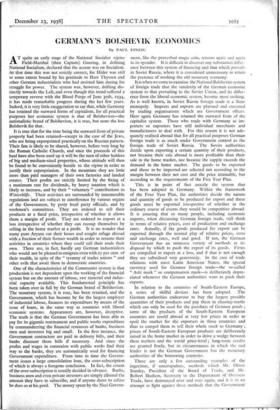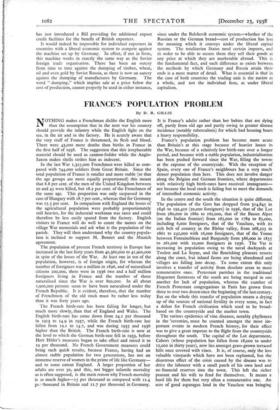GERMANY'S BOLSHEVIK ECONOMICS
By PAUL EINZIG
It is true that for the time being the outward form of private property had been retained—except in the case of the Jews, who are being expropriated practically on the Russian pattern. Their fate is likely to be shared, however, before very long by the Roman Catholic Church, and once the proceeds of this haul have also been used up it will be the turn of other holders of big and medium-sized properties, whose attitude will then be found to be conveniently hostile to the regime in order to justify their expropriation. In the meantime they are little more than paid managers of their own factories and landed estates. Their profits are strictly limited by the fixing of a maximum rate for dividends, by heavy taxation which is likely to increase, and by their " voluntary " contributions to Winterhilfe. Their activities are surrounded by innumerable regulations and are subject to interference by various organs of the Government, by petty local party officials, and by workmen's committees. They are ordered to sell their products at a fixed price, irrespective of whether it allows them a margin of profit. They are ordered to export at a loss irrespective of whether they can recoup themselves by selling in the home market at a profit. It is no wonder that many pure Aryans cut their losses and sought refuge abroad with a fraction of their former wealth in order to resume their activities in countries where they could call their souls their own. There are, in fact, hardly any German industrialists who would not be pleased to emigrate even with 25 per cent. of their wealth, in spite of the " tyranny of trades unions " and other evils that await them in democratic countries.
One of the characteristics of the Communist system is that production is not dependent upon the working of the financial system but on.the amount of labour, raw material and indus- trial capacity available. This fundamental principle has been taken over in full by the German brand of Bolshevism. The monetary system, it is true, has been retained, and the Government, which has become by far the largest employer of industrial labour, finances its expenditure by means of the issue of loans, in the same way as countries with liberal economic systeMs. Appearances are, however, deceptive. The truth is that the German Government has been able to pay for its gigantic rearmament and public works expenditure by commandeering the financial resources of banks, business men and investors big and small. In the first instance, the Government contractors are paid in delivery bills, and their banks discount these bills if necessary. And since the profits and wages in connexion with public works find their way to the banks, they are automatically used for financing Government expenditure. From time to time the Govern- ment issues a large consolidation loan, the over-subscription of which is always a foregone conclusion. In fact, the extent of the over-subscription is usually decided in advance. Banks, business men and even private investors are simply allotted the amount they have to subscribe, and if anyone dares to refuse he does so at his peril. The money spent by the Nazi Govern- ment, like the proverbial magic coin, returns again and again to its spender. It is difficult to discover any substantial differ- ence between this system of financing and that which prevails in Soviet Russia, where it is considered unnecessary to retain the pretence of working the old monetary economy.
It is when we come to examine the National Bolshevist system of foreign trade that the similarity of the German economic system to that prevailing in the Soviet Union, and its differ- ence from the liberal economic system, become most striking. As is well known, in Soviet Russia foreign trade is a State monopoly. Imports and exports are planned and executed by trading organisations which are Government offices. Here again Germany has retained the outward form of the capitalist system. Those who trade with Germany as im- porters or exporters have still individual merchants and manufacturers to deal with. For this reason it is not ade- quately realised abroad that for all practical purposes German foreign trade is as much under Government control as the foreign trade of Soviet Russia. The Soviet authorities decide upon exporting a certain quantity of their products, not because their sale abroad is more profitable than their sale in the home market, nor because the supply exceeds the demand in the home market. The goods to be exported and those to be imported are selected not according to the margin between their net cost and the price attainable, but according to the requirements of the Five Year Plan.
This is in point of fact exactly the system that has been adopted in Germany. Within the framework of the Four Year Plan, the authorities decide the nature and quantity of goods to be produced for export and these goods must be exported irrespective of whether in the ordinary course of events they would be competitive abroad. It is amazing that so many people, including economic experts, when discussing German foreign trade, still think in terms of relative prices, cost of production and exchange rates. Actually, if the goods produced for export can be exported through the normal play of relative prices, costs and exchange rates, well and good. If not, the German Government has an immense variety of methods at its disposal by which to push the export of its goods. Firms are compelled to export at a loss, and if that is not enough they are subsidised very generously. In the case of trade relations with most Latin American States, the special currency used for German foreign trade—the so-called " Aski mark " or compensation mark—is deliberately depre- ciated whenever the German authorities want to push their exports.
In relation to the countries of South-Eastern Europe, a series of skilful devices has been adopted. The German authorities endeavour to buy the largest possible quantities of their products and pay them in clearing-marks which can only be used for the purchase of German goods ; some of the products of the South-Eastern European countries are resold abroad at very low prices in order to spoil the market for the exporters in those countries and thus to compel them to sell their whole stock to Germany ; prices of South-Eastern European products are deliberately raised in the home market in order to drive a wedge between these markets and the world price-level ; long-term credits are granted freely, but in circumstances in which the real lender is not the German Government but the monetary authorities of the borrowing countries.
These are only a few outstanding examples of the ingenious, if unscrupulous, methods which Mr. Oliver Stanley, President of the Board of Trade, and Mr. Robert Hudson, Secretary to the Department of Overseas Trade, have denounced over and over again, and it is in an attempt to fight against these methods that the Government has just introduced a Bill providing for additional export credit facilities for the benefit of British exporters.
It would indeed be impossible for individual exporters in countries with a liberal economic system to compete against the machine set up by Germany. In effect, if not in form, this machine works in exactly the same way as the Soviet foreign trade organisation. There has been an outcry from time to time against the dumping of timber, wheat, oil and even gold by Soviet Russia, as there is now an outcry against the dumping of manufactures by Germany. The word " dumping," which implies sale at a price below the cost of production, cannot properly be used in either instance, since under the Bolshevik economic system—whether of the Russian or the German brand—cost of production has lost the meaning which it conveys under the liberal capital system. The totalitarian States need certain imports, and in order to be able to secure them they sell their' goods at any price at which they are marketable abroad. This 'is the fundamental fact, and such difference as exists between the methods by which Germany and Russia • attain their ends is a mere matter of detail. What is essential is that in the case of both countries the trading unit is the nation as a whole, and not the individual firm, as under liberal capitalism.



































 Previous page
Previous page